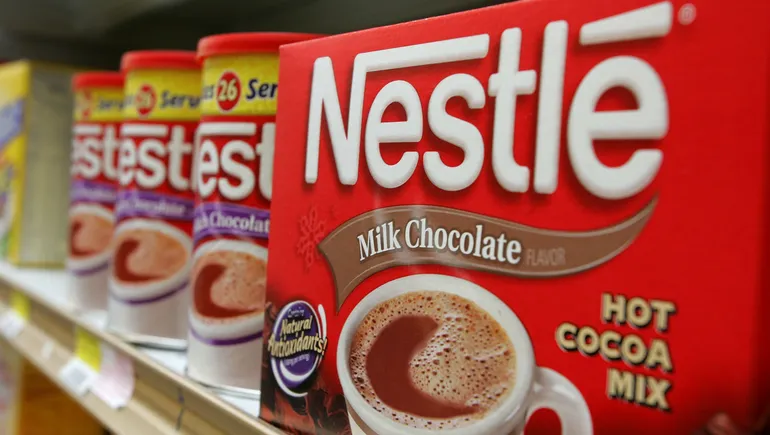Nestlé launches pair of initiatives to decarbonize cocoa supply chain

Dive Brief:
- Nestlé said it is launching two projects aimed at reducing and removing carbon emissions from its cocoa supply chains. The initiative, announced Thursday, builds on the company’s commitment to reach net-zero status by 2050.
- The global food and beverage company said it would develop the two projects alongside suppliers Cargill and Export Trading Group’s Beyond Beans over the course of five years. The projects seek to address climate change’s impact in the cocoa industry by promoting agroforestry, accelerating the shift to regenerative agriculture, and supporting the reforestation of deteriorated land around cocoa farming communities.
- Collectively, the initiatives are estimated to reduce and remove over 500,000 metric tons of carbon over a 20-year period, according to Nestlé. The company also said each project would be set up with a “robust” carbon monitoring and accounting framework that will track its lifetime progress.
Dive Insight:
The company said it would distribute various multi-purpose species of shade trees to farmers, who will be taught tree planting and pruning techniques. Nestlé said introducing shade trees will help reduce the harsh effects of the sun and provide cocoa crops with spaces rich in moisture, enabling them to survive during the dry season. The shade trees will also help improve water management and enhance biodiversity on the farms, in addition to absorbing carbon dioxide from the atmosphere, according to the company.
Together, both projects from the company aim to plant over two million shade trees across land managed by nearly 20,000 farmers in Ghana and Côte d’Ivoire.
Nestlé — which houses over 2,000 brand names under its umbrella — owns several chocolate and confectionery, drinks and ice cream labels that utilize cocoa, including KitKat, Smarties, Milo, Nesquik and Häagen-Dazs. The company is also one of the largest corporate cocoa consumers in the world, buying around 414,000 tons of cocoa annually for its products. The beans, in addition to processed cocoa, come from major cocoa exporters such as Brazil, Ecuador, Venezuela, Mexico and Indonesia, as well as Ghana and Côte d’Ivoire, where Nestlé plans on initiating its shade trees project.
“These projects are important milestones on our journey to net zero,” Darrell High, Nestlé’s global cocoa manager, said in a press release. “We’re working to address our emissions all the way to the farms we source from.”
High said long-term forest protection is only possible through collaboration with “fully committed suppliers,” but that the process also relies on participation from local communities who “have an impact on the forests and can help find land-use solutions that are best suited for the local reality.”
Ursule Gatta, Cargill’s partnership officer overseeing the Ivory Coast, said the company will collaborate with Nestlé to scale up the project to cover 18 cooperatives over the course of five years.
Nestlé’s carbon monitoring and verification program will track both the number of trees planted and the corresponding tons of carbon dioxide sequestered, which the company said will help guarantee verifiable and permanent carbon removals within its supply chain. The monitoring system will also keep track of the effectiveness and efficiency of reforestation initiatives and projects undertaken to restore the surrounding natural landscape.
Source: fooddive.com

